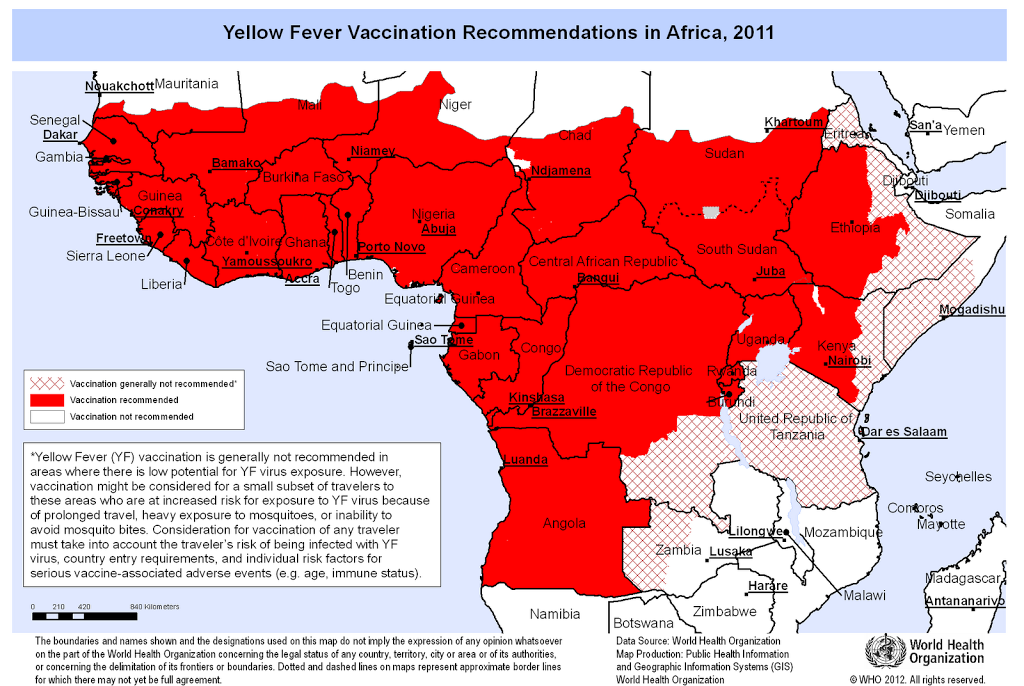
The recent refusal of entry and deportation of about 125 Nigerians who had arrived Johannesburg, South Africa aboard ARIK Airlines from Nigeria on Friday has caused a lot of comment in Nigerian news and social media circles. According to most of the accounts, the Nigerians were refused entry into the country because the South African Port Health Authority had concerns about the validity of the yellow fever vaccination cards that the Nigerian passengers were carrying. The Chairman of the House of Representatives on Diaspora Affairs, Abike Dabiri-Erewa called the action of the South African authorities on Twitter as “unacceptable, pathetic, degrading, unfair and un-African”
A number of issues were raised by the passengers, the Arik Airline spokesperson and Nigerian commentators, suggesting that the refusal to accept the yellow fever certificates was politically motivated. Some of the passengers argued that they had in the past been allowed into South Africa with the same documents, and the airline said that “many passengers have been detained and refused entry in recent months,”
The press statement issued by Arik said South African health authorities gave the reason as incorrect or unrecognised batch numbers on the documentation which is mandatory proof before entry and described the protocol as “irregular and obfuscating” and accused the authorities of arbitrariness.
Interestingly, there was no official statement from the South African port health authorities, thus allowing even more speculation. Online commentators however pointed out that vaccination cards were openly on sale at Murtala Mohammed airport in Lagos, arguing that it was not surprising that the South Africans were sceptical about the documentation.
Whatever the truth around the motivation of the port health authorities, it is evident that our port health systems in Nigeria are not as robust as they ought to be. Putting in place effective travel vaccination processes that satisfy international standards is not rocket science, given the relatively small numbers of people that need them. Leaving the politics aside – there are some incontrovertible facts from a public health perspective. Nigeria is one of several countries at risk of Yellow Fever transmission; South Africa is not (see WHO updated 2011). Vaccines like all other medicines have batch numbers and a date of manufacture and expiry. The reason for this is that in order to track potential contamination – every single batch must be traceable. So it was only a matter of time before the yellow card printing businesses at Murtala Muhammed International Airport were found out.
While we may argue about the high-handedness of the South African response, the truth is that this entire episode could easily have been avoided if the right thing was done by Nigerian travellers. It is interesting to note that not one of the travellers have actually come out to claim that they indeed received the yellow fever vaccine! The crux of their argument seems to be that since they have got away with using the cards in the past, this legitimises the cards as authentic.
This controversy once again throws into the spotlight, the weakness of our arrangements for communicable disease surveillance and control in Nigeria. In addition to the public health benefit for South Africa, vaccination primarily protects the individual being vaccinated. The poor perception among the Nigerian population on the benefits of vaccination is worrying. Vaccines remain one of public health accomplishments of our times. Without starting to boldly address these issues, it is difficult to be as vocal as we ought to be when foreign countries call our systems, processes and documentation into question. Maybe the Ministries of Health and Aviation will surprise Nigerians and set up a functional travel health clinic at MMIA to serve Nigerian travellers, else it is difficult to justify what the Port Health Authorities at our airports actually do.
Never doubt that a small group of thoughtful committed people can change the world; indeed it is the only thing that ever has…Margaret Mead


